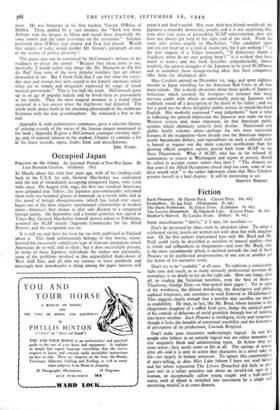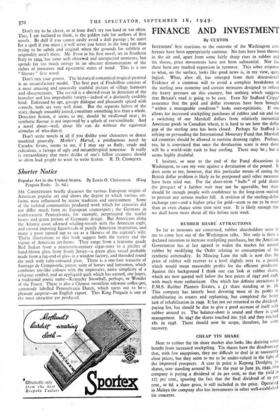Fiction
The Dark Peninsula. By Ernest Frost. (Lehmann. 9s. 6d.)
SOME miscellaneous " don'ts," if I may, for novelists:— Don't be possessed by ideas, even by unspoken ideas. To adapt a celebrated saying, novels are written not with ideas but with imagina- tion. Of the five authors represented here only Mr. Boyd and Mr. Niall could fairly be described as novelists of natural quality—that is, fertile and sympathetic in imagination—and even Mr. Boyd, who is the more uncommonly gifted, is inclined towards the end of Such Pleasure to let intellectual prepossessions of one sort or another get the better of his narrative sense.
Don't try to be " readable " at all costs. To cultivate a consistently light tone and touch, as so many seriously professional novelists do nowadays, is no doubt to err on the right side. How one longs, after all, in reading .,t,hq Victorian novelists, even the best of them- Thackeray, George Eliot—to blue-pencil their pages ! Yet in spite of the wordiness, the dilated moralising, the descriptive and philo- sophical longueurs, one continues to read Esmond or Middlemarch. This suggests clearly enough that a novelist may sacrifice too much to readability. He may, in fact, like Mr. Boyd, whose heroine is the illegitimate daughter of a raffish Irish peer, dodge the satirical point of his comedy of delusions of social grandeur through fear of running into heavy weather. Such Pleasure is intelligent, lively and veracious, though it lacks the breadth of emotional sensibility and the fierceness of perception a its predecessor, Lucinda Brayford.
Don't make your characters undeviatingly logical. In real life people who behave in an entirely logical way arc either monsters or else singularly bleak and uninteresting types. In fiction they are even worse ; they rarely come to life at all. The springs of action, after all—and it is only in action that characters in a novel take on life—are largely in human unreason. To ignore this commonplace of story-telling, as does Miss Lake (whom I have not read before and for whose reputation The Lovers Disturbed did little to pre- pare me) in a rather pointless tale about an invalid-ish ogre of a woman, an exceptionally callow young couple and a half-witted nurse, each of . whom is twitched into movement by a single and unvarying motive; is to court disaster.
Don't try to be clever, or at least don't try too hard or too often. This, I am inclined to think, is the golden rule for authors of first novels. Be dull if you cannot easily avoid a dull passage ; be naive for a spell if you must ; it will serve you better in the long run than trying to be subtle and original when the grounds for subtlety or originality aren't there. Mr. Frost in his first novel, set in Southern Italy in 1944, has some well observed and unexpected moments, but spends far too much energy in an obscure demonstration of the riches of immature and egocentric states of mind. This is a too " literary " first novel.
Don't mix your genres. The historical-romantical-tragical-pastoral Is an unsatisfactory model. The first part of Foxhollow consists of a most amusing and unusually truthful picture of village humours and idiosyncrasies. The record is a shrewd essay in detection of the homelier and less improbable variety—indeed of a distinctly credible kind. Enlivened by apt, gossipy dialogue and pleasantly spiced with comedy, both are very well done. But the separate halves of the story, though smoothly joined, constitute something less than a whole. Detective fiction, it seems to me, should be swallowed neat ; its synthetic flavour is not improved by a splash of verisimilitude. And a novel about—well, about life can do without the equivocal stimulus of who-dun-it.
Don't write novels at all if you dislike your characters or detest mankind generally. Mother's Marvel, a posthumous novel by Caradoc Evans, seems to me, if I may say so flatly, crude and ridiculous, a farrago of ugly and misanthropical nonsense. It really is extraordinary that mere dislike of one's fellow creatures should so often lead people to want to write fiction. R. D. CHARQUES.



































 Previous page
Previous page